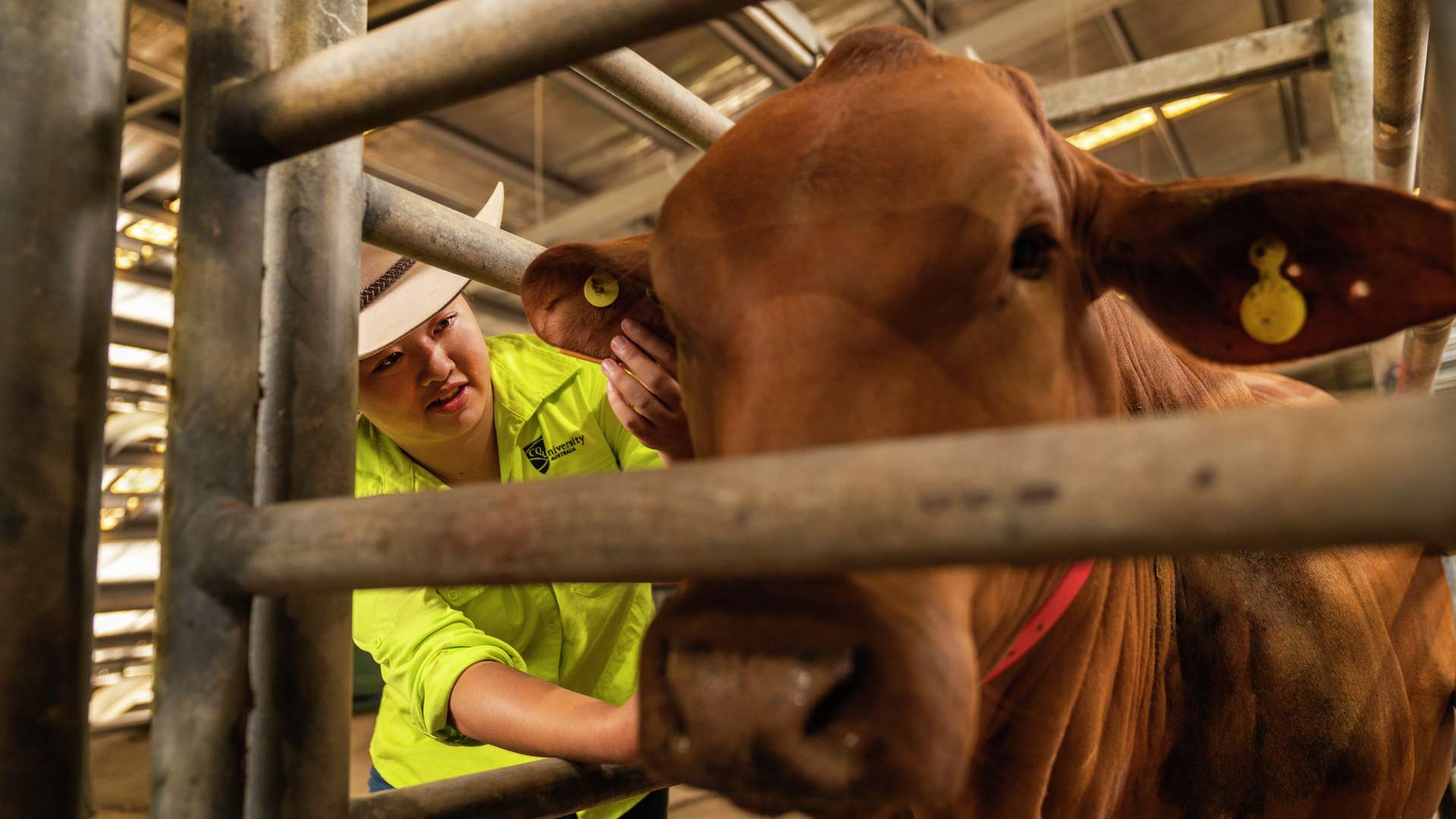
Located in Rockhampton, at the heart of the northern Australian beef industry, the PLM team utilises laboratory and animal house facilities, Belmont Research Station and collaborating producer properties for field research.
With strong links to industry, and producer participation in our research, the PLM team focuses on adaptive research to meet the evolving needs of industry, delivering practical solutions to the challenges faced by livestock producers in both Australia and the Indo-Pacific region.
The team's goal is to provide livestock producers, and other industry stakeholders, with reliable, regionally relevant research findings that support more informed decision making at the policy, industry, enterprise and animal level. The PLM team's research aims to meet the growing global demand for animal derived protein through increased productivity whilst improving welfare outcomes for livestock, developing alternative income generating and land management options for livestock producers, improving the condition of natural resources on farms and developing more efficient and connected value chains. Their research is underpinned by the use of cutting-edge technology to monitor and manage livestock under research and commercial settings.
The PLM team contribute to undergraduate and postgraduate training at CQUniversity, have an established track record in building research capacity across the Indo-Pacific region, and share research findings at a broad range of industry events.
The PLM team have specialist research skills in:
We undertake research with our industry partners to solve the challenges faced by livestock producers in northern Australia and the Indo-Pacific region as they evolve to meet the growing global demand for animal-derived products.
Explore how we are using cutting-edge science to improve productivity, animal welfare and sustainability outcomes for the livestock industries.
Calf mortality remains a significant issue for the north Australian beef industry, with an estimated 0.32 million calves lost annually, costing the industry over $161 million per year. One potential contributor to calf productivity and survival is the role of the cow. In extensive grazing systems, animal monitoring and management interventions are limited, and cows are almost entirely responsible for their calves’ productivity and survival, and the success of the operation hinges on the skills and dedication of the breeding female – the “maternal investment” of the cow.
Mooternal will use sensor systems to provide researchers and producers with a deper understanding of the impact of maternal investment and how it can be optimised in northern Australia. At its conclusion, the project will have developed a suite of tools, algorithms and practical recommendations to enhance calf productivity and survival.
Mooternal is being conducted in collaboration with the Northern Territory Department of Agriculture and Fisheries and is funded by Meat & Livestock Australia Donor Company.
This CRC for Developing Northern Australia funded project will support northern Queensland farmers and rural communities with information and skills needed to profit from resilient crop-livestock systems that deliver a legacy of economic, social and environmental prosperity. The PLM team will determine responses of cattle to a range of tropical forage legumes that may be incorporated into cropping systems, and to a range of sorghum and pulse grains produced in north Queensland cropping systems. On-farm research will investigate supplementation of weaners using local produced protein sources and strategies to optimise utilisation of forage crops grown in rotation with broadacre crops. In addition, CQUniversity researchers will determine the profitability of different crop-livestock production scenarios using data generated in the project.
This research project aims to develop technology for converting crop residue fodder into higher quality feed, which will help livestock producers improve their productivity and income and reduce Greenhouse Gas emissions. Despite being poor in quality (digestibility is often less than 30%), crop residues are a major backbone for tropical ruminant livestock survival feeding. This investment will help develop and commercialise an innovation that converts crop residues into high quality feed. The results of this program will contribute to improved feeding of animals, leading to improved nutrition, increased animal productivity and improved incomes.
Cattle are an important contributor to the national economy and the livelihoods of rural households in Vanuatu through income, ceremonial use, community nutrition and risk mitigation. The PLM team are working with the Department of Industry, Department of Livestock and the Vanuatu Agricultural Research and Technical Centre in Vanuatu and The University of Queensland and QDPI in Australia to develop training and communication methods coupled with updated extension materials to assist smallholder cattle farmers to develop business and farm improvement plans for their cattle businesses.
The project, funded by the Australian Centre for International Agricultural research (ACIAR) is using a Farmer Field School approach to facilitate participatory engagement of rural households in training and research activities within communities. Research activities conducted with farmers and on-station include weed control, water supply and grazing management under shaded pastures in coconut plantations and productivity of local cattle genotypes.
This project is funded by the ACIAR and is titled, ‘Evaluating service provision approaches and value-chain interventions to support milk cooperatives to grow the smallholder dairy sector of Indonesia (IndoDairy 2)’. Key challenges for smallholder dairy farmers include; poor access to quality feed, a lack of land for growing fodder, poor milk quality, low cow and farm productivity, lack of supply chain cooling infrastructure, lack of food safety practices, and access to quality extension.
The project aims to increase production and improve the livelihoods of smallholder farming households in the Indonesian dairy sector. The project will support village-level milk cooperatives to deliver improved services and increase value chain participation for farmer members.
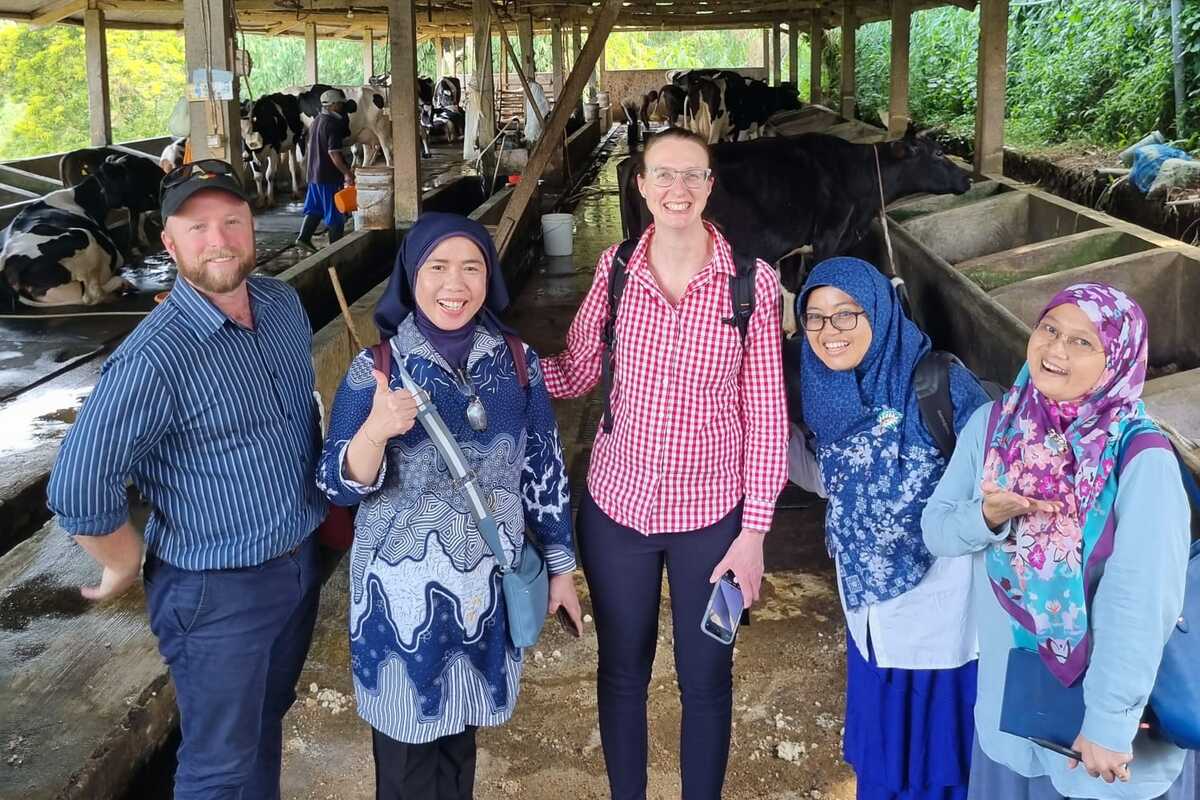
The Philippines Government has placed a high priority on dairy industry development and increasing domestic milk production. To date domestic production represents only 1.3% of the national requirements.
There is an opportunity to grow domestic milk production to meet industry and consumer requirements through a more productive smallholder dairy sector. However, there has been limited research to date, hence a greater understanding of the smallholder systems is needed to better evaluate the opportunities.
This ACIAR funded project will help to identify value chains that engage with smallholder production, what barriers exist for greater participation by smallholder farmers and the key challenges that need to be addressed.
Our previous work has laid a strong foundation for innovation in tropical livestock systems. Learn how our past research has shaped policy, improved on-farm practices, and strengthened industry resilience across the region.
The Decide & Thrive project, now nearing completion, has focused on addressing the critical challenge drought poses for extensive beef cattle production, particularly the need for informed culling decisions. The project has been defining and validating strategies that help producers identify which animals to retain or sell, maximising herd productivity and profitability based on expected drought duration and intensity.
The PLM team’s role in the project has involved evaluating and implementing manual, remote, and automated livestock technologies to collect phenotype data, facilitating accurate in-herd animal performance ranking to support these critical management decisions.
Reducing cow and calf mortality is essential for enhancing sustainability in northern Australian breeding herds. This completed project evaluated nutritional interventions and environmental stress management around calving to reduce mortality rates.
The PLM team’s contribution involved developing and validating on-animal sensor technologies to monitor behavioural and physiological responses of cows and calves to increasing heat load. Significant behavioural changes identified included reduced rumination, altered grazing patterns towards cooler periods, increased use of shade and water, and elevated rumen temperatures. Analysis confirmed that mean temperature alone effectively indicated heat stress impacts, simplifying practical assessment for extensive systems.
Silvopastoral systems offer significant potential value through integrated management practices that combine livestock grazing with tree cultivation, enhancing productivity, environmental sustainability, and financial resilience for grazing enterprises.
This project is investigating the productivity, environmental, and economic impacts of integrating grazing cattle with commercial pine forestry (silvopastoral systems) in northern Queensland.
The research is demonstrating that silvopastoral systems enhance cattle productivity through improved pasture availability and provide diversified revenue streams through carbon sequestration and timber production. These findings have established a solid basis for scaling up the application of silvopastoral systems.
In response to the Australian red meat sector’s goal of achieving carbon neutrality by 2030, the PLM team collaborated with industry to develop innovative solutions for delivering methane-suppressing compounds to grazing cattle through drinking water.
This Meat and Livestock Australia funded research project evaluated the feasibility of incorporating proven and emerging methane-inhibiting compounds into livestock drinking water. It specifically assessed the solubility, stability, palatability, and effectiveness of these compounds, along with their impacts on cattle methane emissions, rumen function, animal health, and productivity.
The beef cattle industries make important contributions to household income and livelihoods, custom ceremonies and community nutrition, employment and gross domestic product in the Pacific Island Countries. All countries in this region are looking to develop and grow their respective industries within the context of an increasingly variable climate, emerging biosecurity risks, increasing costs of production and policy related challenges around land tenure, access to infrastructure, aging workforce and urbanisation, and declining research and extension expertise.
The PLM team facilitated a Pacific Region Beef Event (Beef24) to expose key representatives of ACIAR’s international research partners to innovation, practices, policy and markets in the Australian beef industry, to provide a model to foster interaction between ACIAR’s international partners and public and private sector stakeholders in the Australian beef industry, and to hold a Pacific region beef workshop to identify and prioritise regional research and capacity building issues that may contribute to sustainable and productive Pacific beef industries.
With expertise spanning animal science, digital technologies, and sustainable land management, our multidisciplinary team is at the forefront of livestock research. Meet the researchers working to drive positive change across the industry.
Professor Mark Trotter is a leading researcher in the field of precision livestock management. With hands-on experience in the dairy and beef industries and a background in agribusiness, he brings a practical business emphasis to livestock research.
He focuses on developing sensors and management systems that improve the production, efficiency, and sustainability of grazing livestock systems. Mark leads the PLM team at CQU. He is a Fulbright Scholarship recipient and holds adjunct appointments at The Ohio State University and Oklahoma State University.
Simon’s research focuses on ruminant nutrition and metabolism, and ruminant feeding systems. His research focuses on ruminant nutrition and metabolism, and ruminant feeding systems.
He works primarily with beef cattle but has also worked with sheep and goats. His research has contributed to improved nutritional management to increase the productivity of ruminants across a range of production systems and environments.
His research interests range from applied ruminant feeding systems to understanding the underlying biology that underpins livestock productivity in response to nutrient supply.
He has more than 20 years experience in conducting research and building research capacity to support smallholder livestock producers across southeast Asia and the Pacific and has worked in Indonesia, Timor Leste, Thailand, Myanmar, China and Vanuatu.
Dr Karen Harper is a lecturer and researcher in agriculture. She is a ruminant nutritionist with a focus on tropical pasture utilisation. Research interests include Increasing productivity and reducing methane emissions by supplementation, characterisation of indigestible Neutral Detergent Fiber (iNDF) in tropical pastures and feed formulation for farmer profitability.
Karen is strongly motivated in building successful teams and building the research capacity of students, farmers and scientists. She has worked extensively overseas in programs and projects in Indonesia, Myanmar, Vietnam and Africa with the aim of improving the livelihoods of smallholder farmers. Karen’s goal is to find innovative solutions to livestock industries in Australia and overseas.
David has been working in the international livestock research for development space for over 15 years. He was initially given an opportunity to work in Pakistan managing a research project focussed on dairy extension.
This led to a three-year role based in Lahore coordinating research activities, data collection and capacity building of local employees and field officers. The success of this program led to additional funding, building on the previous work and in terms of project size.
David’s latest project is linking in with new teams to understand dairy systems in both Indonesia and the Philippines. David’s role at CQU continues from his previous research in the development space and is now leading a multi-disciplinary team on a 5-year project (funded by ACIAR) named; “Evaluating Service Provision Approaches and Value-Chain Interventions to Support Milk Cooperatives to Grow the Smallholder Dairy Sector of Indonesia (IndoDairy 2)”.
A critical component of this research is aimed at integrating project recommendations into policy discussions and national extension programs.
Dr Thomas Williams is a researcher within the Precision Livestock Management team, specialising in the development and application of sensor technologies for extensive beef production systems.
He holds a postgraduate degree from Charles Sturt University and previously completed a postdoctoral appointment with the Large Ruminant Health team, where he investigated feedlot therapeutics and diagnostic approaches.
Thomas’s current work focuses on the design, evaluation, and implementation of sensor-based systems to capture previously inaccessible data, enabling improved decision-making at the enterprise level and addressing key research questions for the industry.
Since 2020, his research has centred on advancing remote monitoring tools and methodologies to assess animal health, welfare, and productivity in northern grazing systems, supported by funding from Meat & Livestock Australia, the Future Drought Fund, and the Tropical North Queensland Drought Hub.
Dr Anita Z. Chang is a Senior Postdoctoral Research Fellow with the Precision Livestock Management team. Anita completed a Bachelor of Animal and Veterinary Bioscience (Hons I), majoring in Animal Production Science at The University of Sydney in 2017.
More recently, Anita obtained a PhD in Precision Livestock Management from CQU, with a thesis entitled “The remote, autonomous detection of calving and calf loss using on-animal sensing systems”.
Anita has expertise in data analytics, livestock biomechanics and behaviour, and research in extensive grazing environments, and is an active collaborator with researchers in the United States. Her research interests include precision livestock management, cow-calf interactions, and livestock behaviour.
Dr Priscila Bernardes is a Senior Postdoctoral Research Fellow with the Precision Livestock Management team. Priscila completed her PhD in Animal Breeding and Genetics at Sao Paulo State University in 2018.
She is currently working on the Decide & Thrive project focused on supporting producers in making selection and culling decisions into, during and out of drought. Priscila’s main research interests are precision technologies, statistical analysis of animal science, and pedigree, quantitative and genomic analyses.
Jenny is a researcher with the Precision Livestock Management team. Jenny has an undergraduate degree in Veterinary Science, master’s degree in veterinary public health management, and a PhD which investigated sheep parasites through farm and abattoir studies.
Jenny is currently working on an Australian Centre for International Agricultural Research (ACIAR) funded project called IndoDairy 2. It aims to evaluate service provision approaches and value-chain interventions to support milk cooperatives to grow the smallholder dairy sector of Indonesia.
This builds on her prior experience working on similar international agricultural research for development projects in Pakistan and Myanmar. She aims to co-design research with local communities and multidisciplinary teams to support local ownership and impactful practice changes.
Amy commenced a post-doctoral fellowship in ruminant production systems in the PLM team at Central Queensland University in 2024.
With a varied background in aquaculture, poultry, animal pharmaceutical and red meat industries, Amy arrived at CQU having most recently completed her PhD in 2024 at Charles Sturt University where she explored the effect of breed and mating season on ewe management and potential enterprise profitability and risk across southern Australia. Amy has a keen interest in ruminant nutrition and management practices and the application of this knowledge both in Australia and developing countries.
Jane is an Adoption Officer in the Precision Livestock Management team. She studied a Bachelor of Applied Science at UQ, specialising in rangelands management.
Her industry experience is in beef cattle, agritourism and agribusiness analysis. Jane looks to improve agritech systems and adoption to strengthen our industries responsiveness to variability.
William Luiz de Souza is a Postdoctoral Research Fellow in beef cattle nutrition team and has a joint position within the Precision Livestock Management team and in the Coastal and Marine Ecosystems Research Centre at CQU.
William completed a PhD in Animal Science at São Paulo State University in 2024. He is currently involved in research on nutritional strategies to increase the productive efficiency of beef cattle in both grazing and feedlot systems, strategies to mitigate greenhouse gas emissions from ruminants, describing the nutritional value of micro-algae and improving the feed value of low-quality crop byproducts.
Alan is the Agricultural Partnerships Manager for CQUniversity operating within the Office of Research for the Institute for Future Farming Systems. He studied a Bachelor of Science at UQ, majoring in Information Technology (IT). He has extensive corporate experience in partnership management and business development roles across various market segments, including in particular, banking and finance in Queensland.
Alan also has a very strong affinity with regional Australia and agriculture having owned and operated his own commercial Brangus breeding operation in central Northern NSW for 18 years. More recently, prior to joining CQU, he was the General Manager of a private enterprise which specialised in the production and global marketing of bovine germplasm.
Jonathan is a PhD student at CQU within the School of Health, Medical and Applied Sciences. Jonathon’s PhD is investigating the detection of oestrus using sensor technologies within extensive beef production to provide producers with a greater understanding of key fertility parameters. Jonathan completed a Bachelor of Agricultural Science (Honours), majoring in animal science in 2021. His honours thesis involved using near-infrared spectroscopy to identify feed efficiency performance in tropically adapted steers using tail hair samples.
Justin is a PhD student within CQU’s School of Health, Medical and Applied Sciences. Justin’s research investigates the possibility of detecting difficult calving events in extensively grazed beef cattle using on-animal sensing technologies. Justin completed a Bachelor of Agricultural Science (Honours) at the University of Queensland and majored in plant science after completing an Honours thesis that investigated the long-term changes in pasture composition under different grazing strategies.
Carlos is a PhD student is a PhD student at CQU within the School of Health, Medical and Applied Sciences. Carlos’ research is focused on the productive evaluation of automated weighing and feeding systems in Australia. Previously, Carlos worked as a researcher in the animal nutrition and meat quality group at Argentina’s National Institute of Agricultural Technology (INTA) on topics such as the effect of nutritional management on meat quality, intensive cattle fattening systems, and the use of emerging technologies in livestock systems.
Ryan is a PhD student at CQU within the School of Health, Medical and Applied Sciences. Ryan’s research is focussed on the water-delivery of compounds that may reduce enteric methane emissions from livestock and encompasses both in vitro and in vivo studies. Prior to his PhD, Ryan completed a Bachelor of Science (Honours) at CQUniversity and worked in the mining industry.
Pedro is a PhD student at CQU within the School of Health, Medical and Applied Sciences. Pedro’s research is focussed on the use of probiotics to increase the digestibility of feedstuffs for ruminants.
Explore our other research clusters, each contributing to a more innovative, productive and sustainable future for agriculture across Australia and beyond.
Driving adoption of new farming practices and technologies by changing the way end-users engage with information by combining innovative methods of education, behavioural psychology and mass communications.
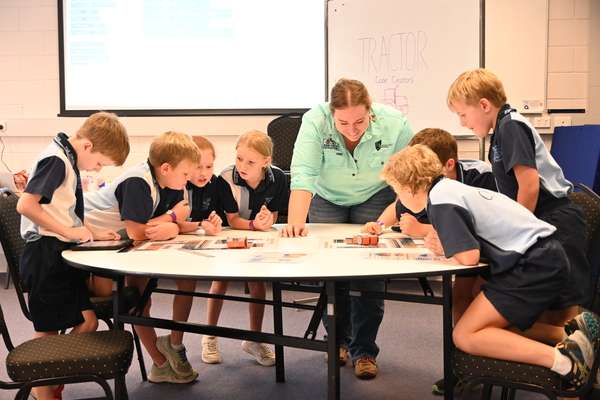
The High-value Tropical Cropping cluster delivers applied research, training, and industry partnerships to boost productivity and sustainability in northern Australian agriculture.
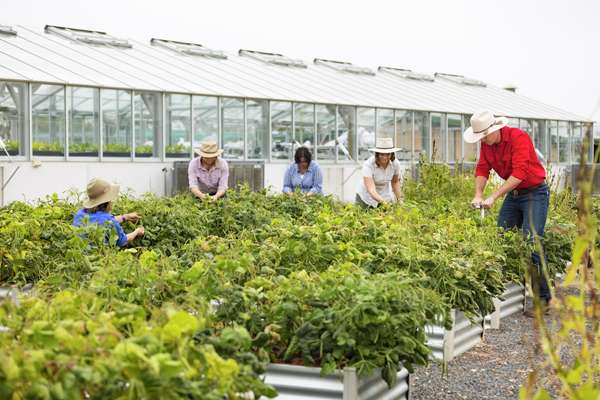
Discover how CQUniversity’s Agricultural Microbial Genomics team is improving livestock health and productivity through gut microbiota research, next-generation probiotics, and sustainable farming solutions.
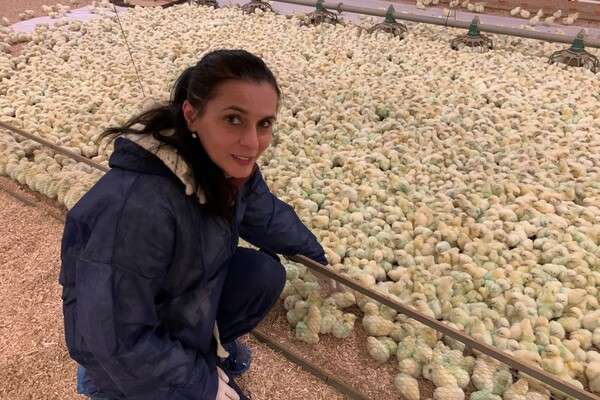
CQUniversity’s Non-Invasive Sensor team has led the world in the use of near infrared spectroscopy for assessing horticultural produce.
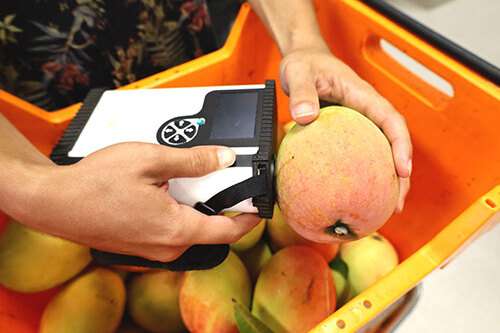
CQUniversity’s Precision Horticulture team is focussed on improving the productivity and profitability of Queensland’s major horticultural commodities.
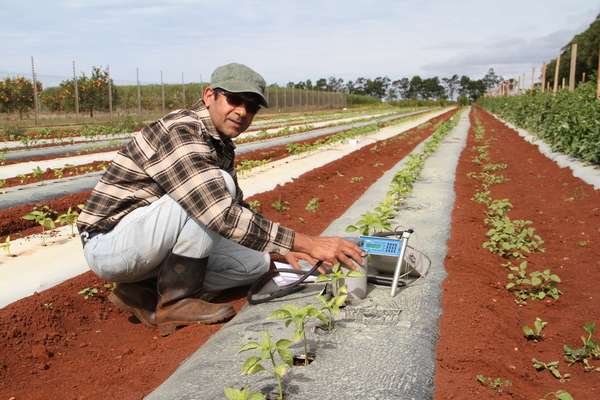
CQUniversity Australia is a trading name of Central Queensland University
ABN: 39 181 103 288
RTO Code: 40939
CRICOS: 00219C
TEQSA: PRV12073